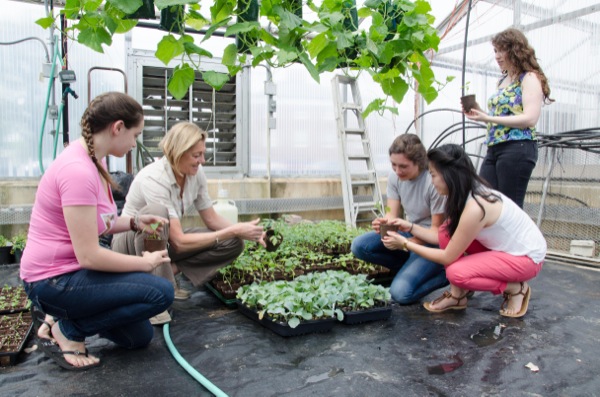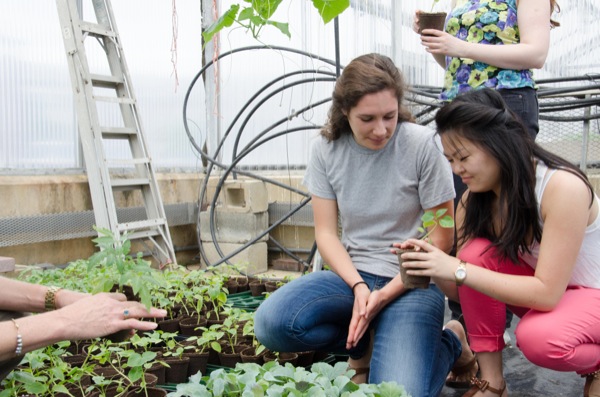


Farm-to-table
UD students learn about complexities of producing food
12:11 p.m., May 5, 2014--Students at the University of Delaware are learning about the step-by-step processes involved in getting food from farms to their plates -- as well as the anthropological and cultural connections that humans make with food -- in a new Farm-to-Table class.
The class is taught by Sue Barton, associate professor in the Department of Plant and Soil Sciences and a Cooperative Extension specialist, who explained that the idea for the class came about from a conversation with her daughter, who graduated UD two years ago.
Campus Stories
From graduates, faculty
Doctoral hooding
“She has a really strong interest in healthy eating and has spent a lot of time looking at websites, and looking at recipes, and she thought that a lot of students would want to learn more about that,” Barton said, adding, “We thought it really should include the whole popular farm-to-table concept, as students also need to know more about where their food actually comes from.”
The class was co-developed by Melissa Melby, assistant professor of anthropology, and involves service-learning opportunities -- each student is required to do two three-hour volunteer stints – as well as interesting in-class discussion and multimedia projects.
There are also guest speakers from all of the departments in UD’s College of Agriculture and Natural Resources (CANR), professionals in the agriculture field and Cooperative Extension agents.
Delaware Secretary of Agriculture Ed Kee was one guest speaker, and talked to the class about food distribution. He will return to the class later in the semester with a farm-to-table restaurateur from Rehoboth.
Jake Jones, a senior in CANR, said the guest speakers are one of his favorite parts of the class and that he especially enjoyed Kee’s presentation. “It’s pretty neat to have a different speaker every class because everybody has different knowledge, and it’s great to have a specialist in there.”
Jones, who hails from a farming background, said that he liked how the class shows people how food gets to their table from the farm and is provided by a farmer.
“It’s nice to see farmers represented because a lot of classes are just about the finished product, but with the farm-to-table you actually get to see that farmers do actually grow your food and all the different aspects that it has to go through to actually get to the consumer,” said Jones. “The consumers are so distant from the farmers and the farms that they don’t realize that it comes from a human who actually grew their food.”
Jones also said he enjoyed the volunteer aspect of the class, noting that he gave of his time at the Food Bank of Delaware, something he would not have thought about had he not taken the class.
The students will also volunteer at UD’s Garden for the Community, getting experience with food distribution and with growing food in a vegetable garden, and they will visit local farmers markets to look for exotic foods and talk with patrons or employees about what they are buying and why.
The students must also research an emerging crop for the class, with groups tackling pomegranates, coconuts, avocados and soursop.
They will interview community garden leaders to find out what makes a garden successful, asking questions about how their gardens got started, how many people use the garden and who are the people using the plots.
Another aspect of the class is watching documentaries about food, and Barton stressed that it is important that the students see every side of a problem, noting that some food documentaries contain misinformation.
“We had a really good discussion of how do you watch these documentaries and understand what’s good information and what’s scare tactics, and is the documentary just trying to sell copies or what’s their mission,” said Barton. “Understanding that helps you decide what you’re going to believe and not believe.”
Barton said it is important to realize that there is not one solution to the problem of healthy eating, and her goal in the Farm-to-Table class is to show how complex the food industry is and to help the students make informed decisions on what they eat and what they buy.
“There is a lot of misinformation out there and I don’t purport to know what’s right and what’s wrong -- all I can do is be a consumer, keep my ears open and think when I read something,” said Barton. “I told the students to think, question, do research yourself, don’t just believe every blog that you read or every documentary that you see. You’ve got to be an informed consumer with as much diverse information as you can get.”
Article by Adam Thomas
Photos by Danielle Quigley









